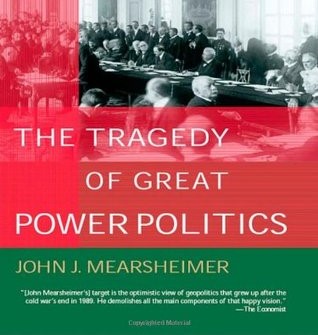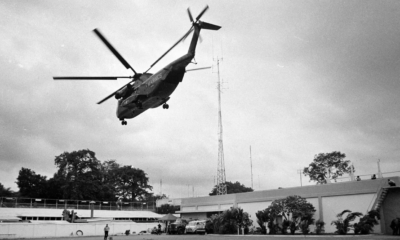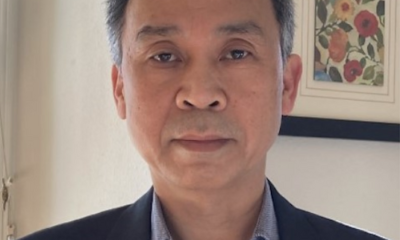After 1975
From Mearsheimer’s ‘Offensive Realism’ to Ukraine and Vietnam
Published on

Abstract
This essay critically examines John Mearsheimer’s theory of offensive realism in the context of contemporary geopolitical dynamics, focusing on the cases of Ukraine and Vietnam. The analysis traces Mearsheimer’s predictions about U.S.-China relations, demonstrating how China’s rise and pursuit of dominance in Northeast Asia have largely confirmed his forecasts. The discussion then pivots to Ukraine, using the conflict as a lens to explore the limitations and contradictions of realist strategies, especially when smaller states face the pressures of great power competition. Finally, the essay considers Vietnam’s strategic options in light of these theoretical insights, arguing that while offensive realism provides a useful framework for understanding major power behavior, it often overlooks the complex domestic factors that influence the survival strategies of small states. Ultimately, the essay calls for a more nuanced approach that reconciles the grand narratives of offensive realism with the realities of smaller nations striving to defend their sovereignty in an increasingly multipolar world.
Keywords: realism politics, Vietnam, Ukraine
“The Tragedy of Great Power Politics”
John Mearsheimer, a professor at the University of Chicago, is the author of the book “Tragedy of Great Power Politics” published in 2001. In this work, he presents the theory of “offensive realism.” According to this theory:
- Due to the imperative of survival, great powers always seek to maintain their dominant position.
- The nature of international relations is uncertain, meaning countries cannot be certain whether another great power will attack them or not. Therefore, proactive defense is always the primary choice for survival.
- Consequently, great powers always:
- Seek dominance in their regional sphere.
- Prevent other great powers from seeking hegemony due to their own survival needs.
- Conflicts between great powers are unavoidable, even when they pursue security. Mearsheimer refers to this inevitable conflict among major powers as the “tragedy of great power politics,” as reflected in the title of his book.
Applying this theory to U.S. international relations, Mearsheimer argues that the U.S. needs to aim to maintain dominance in the Western Hemisphere while preventing the rise of similar hegemons in the Eastern Hemisphere (Europe, Africa, and Asia).
The book was published in 2001, the year when China joined the World Trade Organization, a transformative event for China. In the book’s conclusion, Mearsheimer predicts future U.S.-China relations using his realism theory.
He offered a pessimistic view of the relationship between the two countries and raised cold questions about the current U.S. strategic choices regarding China. Looking back over more than 20 years, from 2001 to 2022, we can see that he was correct.
Mearsheimer wrote:
“It is clear that the most dangerous scenario the United States could face in the early 21st century is China becoming the potential hegemon in Northeast Asia. Of course, the prospects for China becoming a potential hegemon largely depend on whether its economy continues to modernize rapidly. If that happens, and China not only becomes the leading producer of advanced technology but also the wealthiest great power in the world, it is almost certain that the country will use its wealth to build a powerful military machine.“[1]
What Mearsheimer wrote in 2001 proved accurate in 2016 when Xi Jinping officially initiated a military revolution, transforming the Chinese military into a technologically advanced force, emulating the U.S. in both organization and strategy.
Mearsheimer believes that initially, China will aim for regional hegemony in Northeast Asia, with Japan and South Korea as the primary targets. He does not explicitly mention Taiwan.
“Furthermore, for strategic reasons, this country is bound to seek a dominant position in the region, similar to how the United States did in the Western Hemisphere in the 19th century. Therefore, we should anticipate that China will strive to dominate Japan and South Korea, as well as other countries in the region, by building a formidable military force to deter any challenges from other nations. We should also project that China will develop its version of the Monroe Doctrine, directly addressing the United States. Similar to how the United States clearly stated to distant powers that interference in the Western Hemisphere is unacceptable, China will assert that U.S. intervention in Asia is unacceptable.“[2]
Eight years later, in 2009, a U.S. military official revealed that a Chinese general had proposed dividing the Pacific: the eastern Pacific would belong to the U.S., and the western Pacific would belong to China.[3]
This was a “clever” proposal by China. The eastern Pacific mainly consists of the Americas, historically within the U.S. sphere of influence since the 19th century, with resources incomparable to the “western Pacific,” meaning Asia, primarily Southeast Asia, Northeast Asia, and even South Asia if we consider the eastern Pacific including the Indian Ocean.
Thus, China’s ambitions go beyond Northeast Asia, targeting not only the nuclear cores Japan and South Korea but an extensive region in Asia.
Furthermore, China’s Belt and Road Initiative announced in 2013 reveals its ambitions to extend far beyond, spanning Northeast Asia, Southeast Asia, South Asia, Central Asia, then Eastern Europe, Central Europe, Western Europe, and even Africa.
Mearsheimer suggests that China may aim for regional dominance in “Northeast Asia,” with nuclear powers being Japan and South Korea, perhaps based on his theory in the book that vast oceans limit global military deployment, hindering any power from seeking global hegemony. Therefore, these powers are confined to seeking regional dominance.
This theory by Mearsheimer might have been accurate in the world politics before naval technology, starting from the 19th century, developed into a force enabling great powers to maintain dominance beyond the confines of a specific geographical area. Additionally, aviation in the 20th century played a similar role. The competition between the U.S. and the USSR, therefore, extended far beyond Northeast Asia (and Asia) globally.
Mearsheimer also emphasizes that if the United States continues to support China’s rise as a major power, it will be the most formidable player in human history. This is because China is “much stronger and more dangerous than any hegemon the United States has faced in the 20th century.” Players that the United States “settled” with in the 20th century include imperial Japan, Nazi Germany, and the Soviet Union. These players did not have as many resources as the United States, but China is different. If it “becomes a giant Hong Kong, it could potentially have a power four times that of the United States, allowing China to gain decisive military advantage over the United States in Northeast Asia. In that scenario, it is difficult to see how the United States can prevent China from becoming a peer competitor. Moreover, China may become a more formidable superpower than the United States in the subsequent global competition between them.“[4]
Mearsheimer points out the current U.S. policy toward China as a mistake. Instead of making “China’s economy grow slowly over the years, the U.S. has pursued a contrary strategy because the U.S. has committed to China’s ‘integration’ rather than ‘containment.’”
This U.S. strategy “is based on the belief in freedom, thinking that if China can become democratic and prosperous, it will remain a great power as it is and not engage in a security competition with the United States. As a result, the U.S. policy has sought to integrate China into the world economy and create conditions for the country to develop rapidly, expecting that it will remain content with its current position in the international system.”
Mearsheimer points out how this U.S. policy toward China is a mistake. Once again, he predicted these things in 2001. Lý Quang Diệu of Singapore, in his memoir “From Third World to First” in 2000, also commented that the West was overly optimistic about China, seeing it as “wow, another player” without realizing that it would be the most formidable player in human history. According to Mearsheimer’s interpretation:
“A wealthy China will not be a status quo great power like it is now but will be a bellicose country, determined to achieve regional hegemony.
This is not because a wealthy China will have inherently malicious motives but because the best way for any state to maximize its prospects for survival is to become a regional hegemon. Although it is certain that China will seek to become the hegemon in Northeast Asia for its own interests, it is not in the interest of the U.S.”
Therefore, for Mearsheimer, China’s bellicosity is not because of its “nature” being malicious but simply because its interests will naturally lead it to do so. Whether it is a “democratic” and “free” country like the U.S., it cannot act differently. In 2001, when China had just joined the WTO, according to Mearsheimer, it would take a long time for the country to have the “latent power to assert dominance in the region.” So, at that time, it was not too late to “reverse the U.S. policy” and do what could be done to slow down China’s rapid rise.[5]
In 2012, Robert Kaplan commented on Mearsheimer’s book “Tragedy of Great Power Politics” as follows:
“If China collapses due to a social-economic crisis, or develops in some other way that removes its threat potential, Mearsheimer’s theory will run into serious trouble because it does not consider domestic politics. But if China continues to become a military power, reshaping the balance of power in Asia, then Mearsheimer’s ‘Tragedy’ will exist as a classic work.”[6]
The U.S.-China trade war erupted in 2018 under President Trump, and the strategic competition between the two countries continues under President Biden, indicating that Mearsheimer’s vision in 2001 was correct.
In the final chapter of the book, he predicted that “structural compulsions of the international system, which exerts a powerful influence, may force the United States to abandon the policy of engagement in the international environment in the near future” (page 402). This also proved true when reviewing the Trump-era U.S. withdrawal from international institutions. President Biden reversed this policy, deciding to retain the international system that the U.S. had built, grasp it, develop it, rather than destroy it without knowing what to build in its place.
Mearsheimer’s stance on Putin’s invasion of Ukraine has been controversial. When Putin began the invasion on February 24, 2022, Mearsheimer expressed support for Putin and viewed the West (the U.S., NATO) as responsible for the invasion. His arguments, on one hand, relied on misinformation and, on the other hand, contradicted his own “realist” theory.
In an interview with Isaac Chotiner in The New Yorker, Mearsheimer argued as follows:[7]
- The West fabricated the story that Putin is interested in creating a greater Russia or even reconstituting the Soviet Union.
- Putin has never provided any evidence that he is interested in conquering Ukraine.
Isaac Chotiner challenged Mearsheimer, stating that Putin said Ukraine is just a “made-up nation” and when Putin says “Ukraine is a made-up nation,” he means that Ukraine is just a part of Russia, so attacking and controlling it is “culturally” and “historically” justified. However, when responding to Chotiner’s questioning of Putin’s idea, Mearsheimer defended Putin by arguing:
“He believes that it is a made-up nation. I would point out to him that all nations are ‘made up.’ Any student studying nationalism can tell you that. We invent concepts of national identity. They are full of all sorts of myths. So, he is correct about Ukraine, just as he is correct about the United States or Germany. Much more importantly, he understood that he could not conquer Ukraine and integrate it into a greater Russia or into a revival of the old Soviet Union.”
To prepare for the invasion, six months earlier, on July 12, 2021, Putin delivered an official speech titled “On the historical unity of Russians and Ukrainians.”[8] Subsequently, in the launch speech of the invasion, Putin reiterated the historical and territorial perspectives on Ukraine mentioned above once again.[9]
Although Putin immediately denied the intention to restore the “Russian Empire,” it cannot be denied that what Putin said about the “national essence” of Ukraine reflects imperialist ideas, as analyzed by Harvard history professor Serhii Plokhy.[11]
- Putin also declared that Ukraine is part of Russia’s historical territory.
- Putin attributed the creation of Ukraine to the Soviet Union under Vladimir Lenin (criticizing Lenin specifically for this action), despite ample evidence showing a distinct Ukrainian culture before that.
- “Modern Ukraine was entirely created by Russia, specifically Bolshevik, Soviet Russia.”
- Putin: “I would like to emphasize once again that Ukraine is not just a neighboring country for us. It is an integral part of our history, culture, and spiritual space.”
- “These are our compatriots, our relatives, among them are not only colleagues, friends, former colleagues, but also relatives, people connected with us by blood, flesh, and kinship.”
Many scholars have pointed out that Putin’s reinterpretation of history is a pretext and fabrication.
- Serhii Plokhy, a history professor specializing in Ukraine and Eastern Europe at Harvard, addressed Isaac Chotiner in The New Yorker in the article “Putin’s Reinterpretation of the History of Russia and Ukraine,” February 23, 2022.[12] In this interview response, Professor Serhii Plokhy discusses Putin’s “very imperial” ideas and the resistance capabilities of the Ukrainian people.
- Timothy Snyder, a history professor at Yale University, in an NPR (National Public Radio) interview, “How Ukraine’s history differs from Putin’s version,” February 26, 2022.[13]
- An interview by the University of Rochester with Matthew Lenoe, a professor of Russian history at the university: “Fact-checking Putin’s claims that Ukraine and Russia are ‘one people’, March 3, 2022.[14]
- An article by Dr. Björn Alexander Düben, currently a professor at Jilin University in China, “Ukraine không có thật: Kiểm tra sự thật Phiên bản Lịch sử Ukraine của Điện Kremlin” (“There is no Ukraine”: Fact-Checking the Kremlin’s Version of Ukrainian History), on the LSE (London School of Economics) Blog.[15]
Argumentation regarding Putin’s discourse is contradictory, as Mearsheimer suggests that Putin has no imperial intentions. However, Mearsheimer contradicts himself by stating that Russia also aspires to be a regional hegemon similar to the U.S. in the Western Hemisphere. Thus, Mearsheimer argues that U.S. and NATO interference with Russia’s aspirations is a mistake.
Mearsheimer’s argument contradicts his own realism theory. In his book “The Tragedy of Great Power Politics,” he contends that great powers assert dominance in their region but try to prevent others from doing so in different regions. According to him, the correct U.S. strategy is to dominate the Western Hemisphere and prevent other powers from dominating the Eastern Hemisphere.
If one follows this line of thought, the U.S. attempting to hinder Russia’s dominance aligns with Mearsheimer’s realism. Criticizing the U.S. for obstructing Russia’s regional dominance would not only be a misrepresentation of Putin but also a self-contradiction in Mearsheimer’s theory.
Mearsheimer overlooks two key points. Firstly, NATO rejected Ukraine not out of fear of Russia but because Ukraine didn’t meet the organization’s requirements. Secondly, despite viewing NATO as a threat, Putin himself sought NATO membership, which was rejected for similar reasons as Ukraine’s denial.
The pretext of “NATO expansion” by Putin
In the invasion of Ukraine launched on February 24, 2022, Russia declared that Ukraine’s NATO membership posed a “threat” to its western security. Many political scholars following the “realist” school of thought, such as Mearsheimer, also present similar viewpoints.
Putin’s argument and the “realist” scholars’ views are not grounded in reality because:
- Since the 1990s, the NATO “border” has been adjacent to Russia with the accession of Latvia and Estonia. The distance from these neighboring countries to Moscow is equivalent to the distance from Ukraine to Moscow. NATO has been on Russia’s western flank for over 20 years. Therefore, whether Ukraine joins NATO or not, the “security threat” posed by NATO to Russia (assuming this is true) remains unchanged.
- Russia itself had expressed interest in joining NATO. In 1990, as the Soviet Union was preparing to dissolve, Mikhail Gorbachev proposed NATO to include the Soviet Union.
- Putin disclosed that he had proposed Russia’s NATO membership in 2000. NATO Secretary-General Anders Fogh Rasmussen (2014–2019) stated that Putin, when newly in power, repeatedly expressed the intention to join NATO.
- Since the 2000s, Putin has systematically suppressed dissent, imprisoned opposition figures, and executed “power demonstrations,” such as appointing the president of Chechnya in 2007 without an election and aggressive actions in international relations, like annexing Crimea from Ukraine in 2014.
Since the 2000s, Putin has consistently engaged in the killing and imprisonment of dissenting intellectuals, opposition politicians, and executed “power demonstrations.” These actions include issuing decrees to appoint the President of Chechnya in 2007 without the need for an election and aggressive moves in international relations, such as annexing the Crimea Peninsula from Ukraine in 2014.
Given the conditions for democratic institutions, standardized by various NATO indicators, a country like Russia cannot join this organization. As explained by NATO Secretary-General Anders Fogh Rasmussen (2014–2019) in 2019, “NATO would seriously consider allowing Russia to join once it demonstrates a genuinely democratic system and upholds human rights values.”[18]
In terms of policy, NATO is an organization that leaves its doors open for any European country to join if they meet its conditions. The conditions for NATO membership (see NATO’s explanation) are as follows:
- Respect for the values of the North Atlantic Treaty.
- Fulfillment of certain political, economic, and military criteria outlined in the 1995 Alliance Open Door Study. These criteria include:
- A functioning democratic political system based on a market economy foundation.
- Commitment (in practice) to democratic civilian-military relations and structures.
- Fair treatment of minority groups.
- Commitment to resolving conflicts peacefully.
- Capability and willingness to contribute militarily to NATO activities.
Of these, Russia perhaps only meets the last condition (military contribution). Under Putin’s continuous rule since 2000, lasting 22 years, Russia has never known democracy; instead, intellectuals and opposition politicians against Putin have been oppressed.
Not only Russia, but Ukraine also does not fully meet the specified conditions, especially those related to democracy. NATO has never reached a consensus to admit Ukraine into its organization.
Given the stringent standards for democratic institutions (specified through transparency, anti-corruption, legal systems, civil society indices, etc.), Ukraine’s goal of joining NATO (and the EU) is also a commitment to enhancing its national status. However, Putin has interpreted this as “anti-Russia” propaganda to justify the invasion.
As explained by UK Prime Minister Boris Johnson, the crux of the matter lies in Putin’s fear that a Ukraine (closely tied to Russian culture) genuinely embracing democracy would stimulate the democratic aspirations of its people and challenge his autocratic rule of over 20 years. (This is Putin’s choice, while China, with democratic Taiwan, South Korea, and Japan nearby, doesn’t fear them and even finds benefits from their presence.)
The Consistency of Mearsheimer’s Perspective
If we speak in the language of Mearsheimer’s “realist” theory when discussing Ukraine[21], it would be entirely correct (strategically, not morally) if the United States and the United Kingdom appease Russia, sacrificing small countries like Ukraine.
“In an ideal world, it would be fantastic if the people of Ukraine were free to choose their political system and foreign policy. But in the real world, that is not feasible. (…) If Russia perceives Ukraine as an existing threat because it is aligning itself with the U.S. and Western allies, this will cause significant damage to Ukraine. That is precisely what is happening now. Therefore, my argument is: Ukraine’s wise strategy is to sever close ties with the West, especially the United States, and try to integrate with the Russians.”
However, if we speak in the language of Mearsheimer’s “realist” theory in his book “The Tragedy of Great Power Politics,” it would be entirely wrong strategically if the U.S. and the U.K. appease Russia, sacrificing small countries like Ukraine.
- Before World War II, when Germany successively occupied Austria, Czechoslovakia, and Poland, and the Soviet Union attacked Finland, Western Europe continuously appeased Germany and the Soviet Union. The U.S. and the U.K. accepting the spheres of influence of Germany and the Soviet Union was a mistake. Indeed, the U.S. and the U.K. appeasing in the early stages did not satisfy Germany’s needs, leading it not to stop at Poland, Austria, and Czechoslovakia but to attack all of Europe, including the Soviet Union, threatening the U.K. and Germany’s ally, Japan, which then attacked the U.S.
- The U.S. and Europe preventing Germany and the Soviet Union was correct. If great powers cannot control another great power’s dominance, their own survival will be threatened. In the second stage of World War II, when Germany and the Soviet Union became enemies, the U.S. became a major rear base for the Soviet Union, providing abundant weapons and food to help the Soviet Union survive. Once Germany was defeated, the U.S. and the Soviet Union turned to confront each other in the “Cold War” until the Soviet Union collapsed.
However, here Mearsheimer presents a consistent argument with his “realist” theory: He believes that the U.S. should focus on the primary adversary, which is China. The U.S. needs to prevent other great powers from rising in the Asia-Pacific region, but that power is not Russia; it is China.
- Russia only has crude oil, a resource insufficient to rebuild a massive army, enough to restore the former Soviet Empire in Eastern Europe. There is no reason to fear that Russia will become the dominant power in the European region. Russia is not a serious threat to the United States.
- We (the United States) must face a serious threat in the international system. We must confront an opponent of equal standing. And that is China. Our policy in Eastern Europe is weakening our own ability to deal with the most dangerous threat we face in the modern era.
However, U.S. strategists in Washington, D.C. do not think like Mearsheimer when discussing Ukraine; instead, they think like Mearsheimer in “The Tragedy of Great Power Politics.” The U.S. has achieved strategic benefits by isolating Russia and providing massive support to Ukraine against Russia. The greatest benefit for the U.S. is breaking the Russia-China alliance, making Europe strengthen its defense and NATO cohesion, stabilizing the most critical part of the Eastern Hemisphere, to be able to focus on China. This is what the U.S. has been striving for from the Trump era to the Biden era, at least until now, with no factual and logical basis to claim that the U.S. will weaken due to assistance to Ukraine against Russia.[23]
From “The Tragedy of Great Power Politics” to “The Tragedy of Small Power Politics”
John Mearsheimer and the proponents of “realism” are only concerned with the rights of major powers. They overlook the needs, interests, and right to existence of small countries. In the Ukrainian narrative, according to Mearsheimer, a “wise” Ukraine would break ties with the West and “try to integrate with Russia.”
According to “realism,” small countries do not have the “right to national self-determination.”
Blood must be shed to defend political freedom and democracy, rather than accepting leadership from foreign tyrants and dictators. True freedom must be paid for with blood. This is the heroic tragedy of Ukraine today.
Mearsheimer is not concerned with the “tragedy of small power politics,” but small countries are. Faced with realist theorists, the question for small countries is, besides two options: either become vassals, surrendering to the violence of great power politics, or shed blood and suffering to live according to their desired values, is there any other survival strategy? A strategy that protects the national honor and allows them to live according to their values while avoiding direct confrontation with great powers?
To study “the tragedy of small power politics,” a comprehensive book like Mearsheimer’s “The Tragedy of Great Power Politics” is undoubtedly needed. In the confines of a short article, I will list below some key strategies for the survival of small countries in history.
- The “One-Sided Turn” Strategy: A strategy involving a complete alignment towards one side.
- The “Shock Troop” Strategy for One Side: A strategy of acting as shock troops for one faction.
- The “Pledge to Both Sides” Strategy: A strategy of pledging allegiance to both factions.
- The “Neutral” Strategy: A strategy of remaining neutral.
- The “Sit on the Mountain and Watch Tigers Fight” Strategy: A strategy of staying aloof while major powers contend.
- The “Offering Sacrifices for Peace” Strategy: A strategy of making sacrifices for the sake of peace.
- The “Powerful Defense of the Homeland” Strategy: A strategy focusing on building a strong defense.
History shows that, among these strategies, only the last one, the “Powerful Defense of the Homeland,” if successfully implemented, can help small states survive amid the conflicts of great powers. Other strategies fail to achieve the long-term goal of maintaining lasting peace and survival.
In the history of the world, the Trinh Dynasty during the “Dong Chu Liet Quoc” period, from the 7th century to the 2nd century BCE in the region that is present-day China, is an interesting case. It was a small state trapped between two great powers, Tan and Suo, and underwent most of the strategies mentioned above, depending on the evolving relationships with major powers and internal politics. It has tilted to one side, but the other side intervened to pull it back. It has acted as a shock troop for one side and got attacked by the other. It switched to pledging allegiance to both sides, but each side set up a strategy to claim it as its own. It wanted to remain neutral, but no one allowed it to. It plotted for Tan and Suo to directly confront each other, releasing itself (the “Sit on the Mountain and Watch Tigers Fight” strategy), but the two major powers only had minor clashes and immediately stopped: they only lived in peace after settling the buffer zone, which was the Trinh state. It dreamed of the “Powerful Defense of the Homeland” but failed due to a lack of resources, a shortage of talent, or having talent but only achieving a little before being envied and criticized, leading to the king’s execution. In the end, the Trinh state perished. (However, when Qin Shi Huang emerged, other major powers also perished.)
Today, the international context is very different from the Dong Chu period two millennia ago in the present-day territory of China. Although the context has changed, survival strategies remain unchanged, only differing in their manifestation in a new context.
There are many factors influencing the survival strategy choices of small countries when facing great powers. Among them, domestic politics plays a crucial role, sometimes more than the relationship between a small country and major powers.
The Influence of Domestic Politics on Survival Choices
Mearsheimer does not examine the impact of the internal politics of each country on survival choices. Mearsheimer’s theory is based on an assumption that the governments of all countries are highly “rational,” acting without emotions and considering only the survival needs of their nation. Mearsheimer’s assumption is not realistic:
- In many cases, leaders’ choices are predominantly influenced by beliefs and emotions.
- On the other hand, the survival of the nation is not always the primary concern. In many cases, leaders are concerned with maintaining power, the interests of the ruling group, meaning they are only interested in short-term local benefits.
If there are not just two but three, four, or more major powers competing with each other, small countries have to solve a much more complex problem. If solved incorrectly, they may end up in a “four horses pulling in different directions” situation, being pulled in different directions by each major power. Therefore, explaining the choices of each small country on the grand chessboard of major powers is not a simple task.
For Vietnam, many people share the dream that Vietnam will choose the final strategy, the “Powerful Defense of the Homeland,” because Vietnam has abundant resources, making that dream not unrealistic. It is a long and short story. Long because it is complex and cannot be succinctly explained in a short time. Vietnam being caught in the middle-income trap is certain. Short because Vietnam does not have much time, only one or two generations to escape the trap and realize that dream, or the dream will permanently come to an end.
Editor’s Note: This article was initially published on April 16, 2022, on our Vietnamese site. The current version has been translated by Vinh Phu Pham for our English readers.
References:
[1] John Mearsheimer, The Tragedy of Great Power Politics, W. W. Norton & Company, 2001, trang 401
[2] Ibid, trang 401
[3] China proposed division of Pacific, Indian Ocean regions, we declined: US Admiral, by Manu Pubby, New Delhi, May 15 2009,
[4] John Mearsheimer, The Tragedy of Great Power Politics, W. W. Norton & Company, 2001, trang 402
[5] Ibid, trang 402
[6] Robert Kaplan, Why John J. Mearsheimer Is Right (About Some Things), Feb 2012
[7] Why John Mearsheimer Blames the U.S. for the Crisis in Ukraine, by Isaac Chotiner, March 1, 2022
https://www.newyorker.com/news/q-and-a/why-john-mearsheimer-blames-the-us-for-the-crisis-in-ukraine
[8] Bài được đăng trên Website Điện Kremlin 12 July 2021
“On the historical unity of Russians and Ukrainians,” http://www.en.kremlin.ru/events/president/news/66181
Nếu không truy cập được Website Điện Kremlin, có thể xem bài này trên Wikipedia.
https://en.wikisource.org/wiki/On_the_Historical_Unity_of_Russians_and_Ukrainians
[9] Văn bản bài phát biểu trên truyền hình của Vladimir Putin về quốc gia Ukraine, ngày 24 tháng 2 năm 2022 (Transcript: Vladimir Putin’s Televised Address on Ukraine, Bloomberg News, February 24, 2022
[10] Putin denies planning to revive the Russian empire after declaring that Ukraine is not a real country and sending troops there, by Sinéad Baker, Feb 22, 2022
[11] Vladimir Putin’s Revisionist History of Russia and Ukraine, by Isaac Chotiner, February 23, 2022
https://www.newyorker.com/news/q-and-a/vladimir-putins-revisionist-history-of-russia-and-ukraine
[12] Vladimir Putin’s Revisionist History of Russia and Ukraine, by Isaac Chotiner, February 23, 2022
https://www.newyorker.com/news/q-and-a/vladimir-putins-revisionist-history-of-russia-and-ukraine
[13] How Ukraine’s history differs from Putin’s version, February 26, 2022
https://www.npr.org/2022/02/26/1083332620/how-ukraines-history-differs-from-putins-version
[14] University of Rochester, Fact-checking Putin’s claims that Ukraine and Russia are ‘one people’, March 3, 2022 https://www.rochester.edu/newscenter/ukraine-history-fact-checking-putin-513812/
[15] Björn Alexander Düben, “There is no Ukraine”: Fact-Checking the Kremlin’s Version of Ukrainian History, LSE Blog (Trường Kinh tế Chính trị London, Đại học London)
[16] A Broken Promise? What the West Really Told Moscow About NATO Expansion
By Mary Elise Sarotte, Foreign Affair, September/October 2014
https://www.foreignaffairs.com/articles/russia-fsu/2014-08-11/broken-promise
[17] Breaking Down the Complicated Relationship Between Russia and NATO
BY MADELINE ROACHE APRIL 4, 2019 https://time.com/5564207/russia-nato-relationship/
[18] Breaking Down the Complicated Relationship Between Russia and NATO
BY MADELINE ROACHE APRIL 4, 2019 https://time.com/5564207/russia-nato-relationship/
[19] NATO: NATO Enlargement & Open Door, July 2016
[20] Boris Johnson says Vladimir Putin invaded Ukraine because he’s ‘terrified’ of a revolution in Russia
By Richard Vaughan, iNews, March 19, 2022
[21] Why John Mearsheimer Blames the U.S. for the Crisis in Ukraine, by Isaac Chotiner, March 1, 2022
https://www.newyorker.com/news/q-and-a/why-john-mearsheimer-blames-the-us-for-the-crisis-in-ukraine
[22] Phần Lan đánh tan cuộc xâm lăng của Liên Xô nhưng vẫn phải cắt đất cầu hòa để yên thân vì Phần Lan quá nhỏ. Còn Ba Lan thì bị Liên Xô và Đức chia nhau, bị Liên Xô tàn sát tầng lớp tinh hoa.
[23] The invasion of Ukraine unites the American people against Russia and Putin, by William A. Galston, March 16, 2022
U.S. and Allies Seek United Front on Russia-Ukraine Crisis, Jan. 25, 2022, Updated March 29, 2022 https://www.nytimes.com/live/2022/01/25/world/ukraine-russia-us

Translation: The Decision in 2013 of the Central Committee of the Communist Party of China on Certain Major Issues Concerning Comprehensively Deepening Reform

Thủ Đức Demonstration High School: A Modern Educational Policy and Teaching Method of the Republic of Vietnam

Southeast Asia falls into China’s Trans-Asian Railway Network

A Proposed Outline for a Study on Republicanism in Modern Vietnamese History

Tran Le Xuan – Diplomatic Letters

Vietnam’s unresolved leadership question

Rethinking History and News Media in South Vietnam

Pandemics and Morality: Lessons from Hanoi

Democracy in action: The 1970 Senatorial elections in the Republic of Vietnam (Part 1)

“The Vietnam War Was an Unwinnable War”: On Factuality and Orthodoxy
US-VIETNAM REVIEW
-

 Politics & Economy4 years ago
Politics & Economy4 years agoVietnam’s unresolved leadership question
-

 Politics & Economy1 year ago
Politics & Economy1 year agoRethinking History and News Media in South Vietnam
-

 Society & Culture5 years ago
Society & Culture5 years agoPandemics and Morality: Lessons from Hanoi
-

 ARCHIVES5 years ago
ARCHIVES5 years agoDemocracy in action: The 1970 Senatorial elections in the Republic of Vietnam (Part 1)
-

 After 19751 year ago
After 19751 year ago“The Vietnam War Was an Unwinnable War”: On Factuality and Orthodoxy
-

 Politics & Economy4 years ago
Politics & Economy4 years agoThe Limit to U.S.-Vietnam Security Cooperation
-

 Politics & Economy5 years ago
Politics & Economy5 years agoNational Shame: How We (Americans) can learn from Nguyễn An Ninh
-

 Politics & Economy4 years ago
Politics & Economy4 years agoUS-Vietnam Partnership must Prioritize Vietnamese Education






